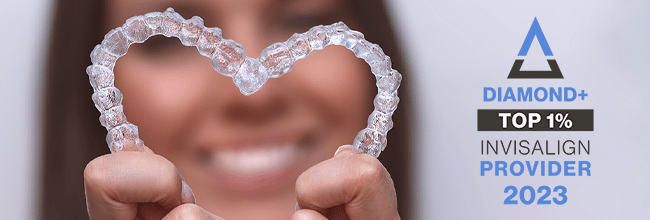
Invisalign takes a modern approach to straightening teeth--using a series of custom-made aligners created for you and only you. You can improve your smile with a system that’s just as effective as traditional metal braces, but is removable, comfortable, completely customized—and nearly invisible. If you or your teen has been told that you should consider orthodontic care, then it’s time to learn more about Invisalign®.

You can improve your smile with a system that’s just as effective as traditional metal braces, but is removable, comfortable, completely customized—and nearly invisible. If you or your teen has been told that you should consider orthodontic care, then it’s time to learn more about Invisalign®.
Invisalign® is a series of removable, invisible aligners that can help you achieve a confident smile without traditional brackets and wires. Invisalign® is an alternative orthodontic treatment for adults and teens.
Schedule Consult
Invisalign® clear aligners are virtually invisible. The eyes will be on your smile, and not your treatment.

The clear plastic material of the aligners is gentle on cheeks and gums.

You can take your aligners out to eat, practice musical instruments, brush your teeth, or attend important events.

Clear aligners are custom-molded with your dream smile in mind, and we use state-of-the-art digital scans to create precise molds.
King Orthodontics is one of Western Pennsylvania’s leading providers of Invisalign®. Designated by Invisalign® as a Top 1% provider in North America and is a Diamond Plus Invisalign® provider, King Orthodontics has treated over 6,000 cases with Invisalign®. Additionally, King Orthodontics is a member of the Invisalign® Century Club, an honor that is given to the top 100 providers in the United States. That extensive experience enables the doctors of King Orthodontics to treat the most difficult cases, often times treating patients that were told Invisalign® was not for them.
Call King Orthodontics today for a complementary Invisalign® consultation to learn more about the benefits of this system that’s custom-designed for your teeth.
Learn more about Invisalign by reading through the common questions we get from patients.
First, an intra-oral scan of your mouth is completed at your initial consultation appointment. Dr. King then creates a digital treatment plan that is totally customized to your oral care needs. This means that every single tooth movement is pre-programmed from the outset. Using this information, your braces are manufactured utilizing 3D printing to accommodate each tooth’s shape and intended movement. Dr. King is also provided with 3D printed trays that are custom to your teeth to ensure your braces are placed in the exact positions needed for the most efficient and effective treatment.
LightForce Braces are composed of white ceramic. These white brackets provide you with the ability to dress up or dress down. You can also choose clear ligature bands or add a pop of color with colored ligature bands.
Once we’ve submitted your scan, we will also provide a suggested treatment plan within 48 hours to be reviewed by a doctor. Once the treatment plan has been approved, you can expect your braces to come within 4-6 weeks. When they arrive, we will schedule an appointment to place them on your teeth. Bonding the braces to the teeth takes about five minutes.
Luckily, the braces are shipped with a set of backup brackets. We can use these to replace your broken or lost bracket without the need to rescan since the brace is custom-made to your tooth’s anatomy, which does not change.
LightForce Braces offer a superior fit because they are 100% formed to the specific curves of each of your teeth.
Invisalign will have a minimal impact on your daily life. The aligners are clear and nearly invisible and can be removed for eating, drinking, brushing, and flossing. They can also be removed for special occasions, playing sports, or playing an instrument.
No. You can remove your aligners before eating, so you don’t have to restrict yourself from foods such as caramel or popcorn like you would with traditional braces.
Children, teens, and adults can use Invisalign as an alternative to metal braces. Nearly all simple to complex bite issues and teeth-straightening problems can be treated with Invisalign. Your dentist can perform an exam to determine if Invisalign will meet your treatment needs.
You should wear your aligners 20-22 hours a day, only removing them to eat, drink, brush, and floss. You can expect to change to a new set of aligners every 1 to 2 weeks.
You can use the Invisalign Cleaning System to care for your aligners, or you can brush them with a toothbrush and toothpaste and rinse them with lukewarm water. Avoid using hot water because it can warp the plastic, ruining the aligner. Be sure to brush your teeth after every meal before you place your aligners back into your mouth.
Two convenient office locations in Wexford and Bridgeville to meet your needs.
For over 30 years, King Orthodontics has helped children and adult achieve confident, healthy smiles.

From Invisalign, Periodontics, and Two-Phase Treatment and more, King Orthodontics uses the best technology to serve their patients.
Easily schedule your next appointment using our convenient online scheduling system.
Several financial options are available including payment plans and convenient online payment services.